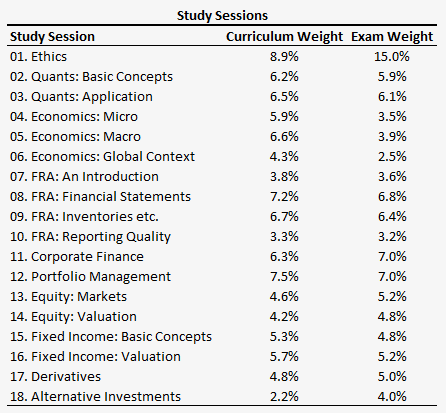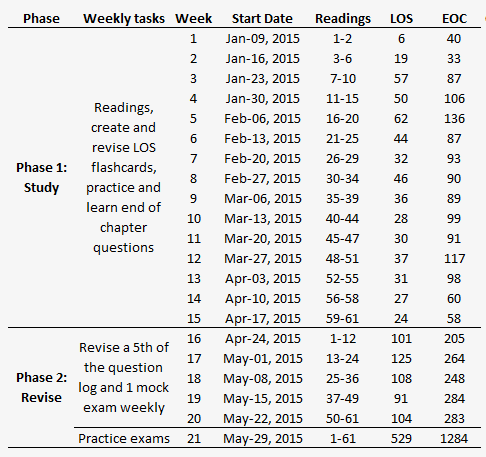So, how did your first week go?
Did you follow through with the active learning process described? And if so, how did it feel? Did you create a stack of flashcards? Did you create a question log and update it with the most difficult flashcards and end of chapter questions? And how did it feel hunting through the text to find the answers to the flashcard questions? Please remember to record your progress in the week 1 progress report.
If you are like most candidates it probably felt a little bit awkward at first. You may even have given up half way through and returned to just reading the material. But trust me, this way of studying may feel slightly more challenging at first, but it is well worth the added effort as it will boost your confidence and comprehension of the material. Once you get the hang of it, you will be able to focus your attention on the exact information that you need to learn, take effective notes on the flashcards that you can use for the revision process later and build your confidence as you work your way through the end of chapter questions eliminating the challenging questions one by one.
So, let us continue with the same study approach that we learned last week and work our way through the final 2 readings in Ethics, along with the first two readings in Quantitative Methods. Reading 3 is just 4 short pages and reading 4 contains a lot of optional segments, the Quants readings are slightly more intense in terms of LOS and end of chapter questions.
- Write down the LOS relating to each reading on individual flashcards. Have a look at Quizlet (Android / iTunes) for an easy to use, free smartphone app solution. Write down the answers on the flip side of each flashcard as you discover them in the curriculum/study guide of choice and include the relevant book-, reading-, page- and LOS numbers. In addition if you come across key concepts and/or formulas not directly covered by the LOS and write them down as questions on separate flashcards (with the answer and book-, reading-, page number on the flip side), this will become particularly relevant in Quants, as there are plenty of formulas in this topic area.
- Answer the end of chapter questions in each reading (if there are any) and revise your answers. Make a note of any questions that you answered incorrectly in your question log and record your score in the week 2 FEA Elite progress report.
- On the following day, redo the difficult flashcards and end of chapter questions from your question log. Revise your answers and redo this process for as many days as required until you have mastered all of them. Rather than just rehearsing the correct answer, make sure that you really understand the reason behind the answers. You can begin the next reading while wrapping up this process, just make sure that you allocate a little bit of time for step 3 each day until you have mastered all.
If you apply this same procedure rigorously to every single reading in the curriculum you will enter the revision stage with some very useful revisions tools that are uniquely tailored to you.
1. You will have a complete list of all the questions in the curriculum that you personally have been struggling to answer while studying (This is a clear advantage compared to other candidates that will waste valuable time re-answering questions that they already know the answer to).
2. You will have a stack of flashcards with a description of all the LOS, key concepts and formulas throughout the entire curriculum that you can use to quiz yourself and quickly refresh your memory.
Once you are done this week you’ve got the most important 15% of the test covered and then some, not bad for two weeks work. Let’s build on the momentum.
Your 21 week study program:
We are aiming to get through the curriculum 6 weeks in advance of the test, allowing you to spend the remaining 6 weeks on concentrated question practice. As a result we have set aside 15 weeks to run through the curriculum. You will notice that the curriculum is split into 18 study sessions, but there are a few shorter ones enabling us to get through the curriculum in 15 weeks, if we cluster some of these together. The table below illustrates the size of the 18 study sessions in the curriculum (in the Pages column) and the estimated size of the study sessions on the test (in the Exam column).

Source: Financial Exam Academy (Based on the CFA® exam curriculum – level 1 – June 2016 Exam)
A couple of points to note:
- As discussed last week the Ethics study session carries a disproportionately large exam weight (15%) compared to its curriculum weight (9.2%).
- The reverse relationship is true for the 3 Economics study sessions.
- Study sessions 10 and 18 are really tiny, by any measure, compared to the rest.
So keeping these points in mind, we have segmented study sessions/readings into a 21 week study program as follows:

Source: Financial Exam Academy (Based on the CFA® exam curriculum – level 1 – June 2016 Exam)
As you can see the 3 Economics study sessions have been consolidated within a 2 week program, given their limited guideline exam weight. It is going to be 2 pretty tough weeks, but the low guideline exam weighting just does not justify spending any more time on these study sessions. If you are using an abbreviated study guide like Wiley. Dealing with Economics is going to be a lot easier.
So here you have it, your 21 week study program to tackle the CFA exam curriculum. Please do not forget to report back in the week 2 progress report when you have completed this week’s tasks, so I can keep you accountable if you are lagging behind.
In week 3 we are continuing with Quants.
